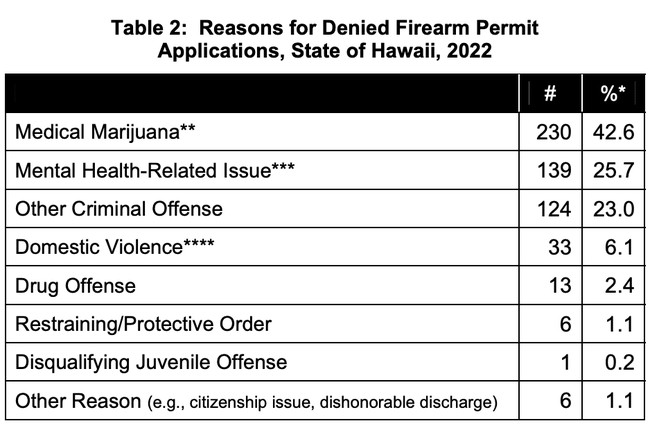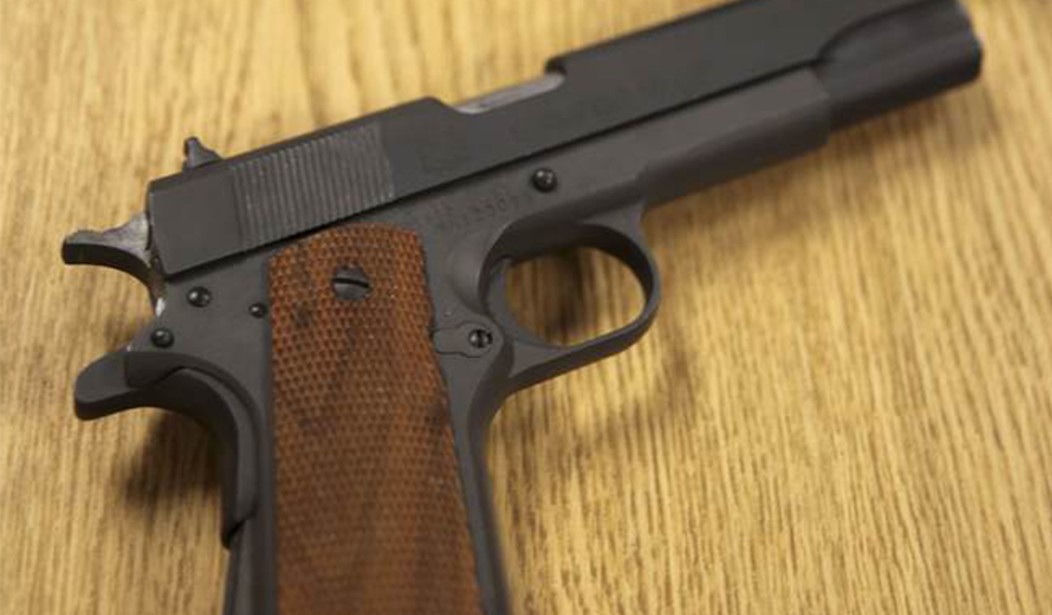According to a new report issued by Hawaii Attorney General Annie Lopez, the number of firearm permit applications in the state actually declined slightly last year; somewhat surprising given that the Supreme Court’s decision in Bruen has generally led to a growing number of Americans applying for both concealed carry licenses and permits to possess firearms in the handful of states where those government-issued permission slips are still required.
The biggest takeaway from Lopez’s report isn’t the 6.1% decrease in permit applications, however, at least not to me. It’s the hundreds of Hawaiian residents who’ve been denied a permit because they possess a state-issued medical marijuana card. In fact, possessing a medical marijuana card is the biggest prohibiting factor for would-be gun owners in the state, and it’s not even close.

Almost 43% of all denials were due to the applicant possessing a medical marijuana license that allows them to consume cannabis with a doctor’s approval, even if they may choose not to partake. In fact, as the AG notes, police departments in cities like Honolulu will issue blanket denials to any and all applicants with a medical marijuana card for up to a year after that card has expired, so even those who no longer possess a valid medical marijuana license are still being turned away and are unable to lawfully exercise their right to even keep a gun in their home for self-defense.
The 230 denials may pale in comparison to the more than 20,000 applications that were approved, but behind every one of those rejections is a person who tried to stay within the bounds of the law and were told they must make a choice between their health and their fundamental right to keep and bear arms. In fact, just 13 permits were denied to individuals for drug offenses, so those folks who are making an effort to comply with all of the applicable state laws are likely getting caught more frequently than drug abusers who apply for a permit.
For now, recreational marijuana remains illegal in Hawaii, though the state Senate voted in favor a legalization bill earlier this year. While the legislation failed to make it out of the state House, Lopez testified that she’s willing to work with lawmakers to craft a legalization bill to be introduced next session.
“We’re going to use the summer and our experience thus far—as well as the experience of other states—to make sure that we can create a structure that will allow the state to have legal recreational marijuana with as few problems as the other states on the mainland have experienced,” she said.
The official said that while the department would be “more than happy” to participate in a separate legalization working group that’s being proposed as part of a legislative resolution, she intends to start organizing a multi-agency effort, bringing together the state Department of Health, Department of Agriculture and law enforcement agencies “so that we have consensus that what we’re developing will be supported by the executive branch.”
“I’ve changed our position from opposition to ‘that train has left the station,’” Lopez said. “So let’s find a way to help you. Let’s give you those guardrails so that you can implement the law and the policy that you want.”
Legalization at the state level would be good news for those current medical marijuana patients, though it still wouldn’t touch the federal prohibition on unlawful use of drugs and lawful gun possession that’s enforced against Americans whose last name isn’t “Biden”. Marijuana users who want to exercise their right to keep and bear arms could still run afoul of federal law, but they’d probably be able to avoid having their permits denied by local law enforcement because there would no longer be a paper trail connecting them to the purchase or possession of cannabis.
Far from all the talk from gun control activists about permitting systems blocking violent offenders from being able to get ahold of a gun, the Hawaii AG’s report shows who’s really being impacted by these permitting and registration schemes; folks who are trying to live within the boundaries of the unreasonable laws that have been put in place at both the state and federal level. Some of them may choose to violate those laws and hope that they can avoid detection, while others will choose to sacrifice either their health or their civil rights in order to comply with the law, but either way this new report from Hawaii’s Attorney General shows us that the state’s permitting scheme isn’t doing nearly as well at keeping criminals away from guns as it is medical marijuana patients who are trying to do the right thing.








